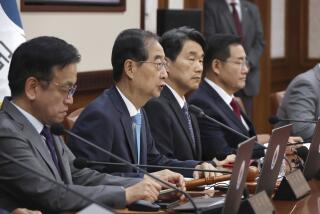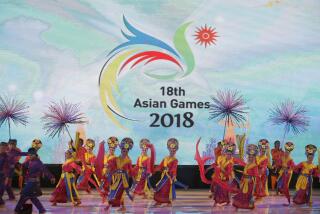North, South Korea Suspend Talks : Delegates Pledge to Meet Again but After the Olympic Games
- Share via
PANMUNJOM, Korea — Bickering delegates from the national assemblies of North and South Korea failed Friday to decide on a format for an interparliamentary conference, killing what was almost certainly the last chance to negotiate a plan to involve North Korean athletes in the Seoul Olympics.
The delegates, meeting at this truce village in the demilitarized zone that separates the two Koreas, agreed to suspend their preliminary talks until Oct. 13, 11 days after the Olympic Games end.
Friday’s session was the fourth since the talks began a week ago, and although the two sides remain at an impasse over the Olympic problem, the fact that they parted with smiles and a promise to meet again was seen as an encouraging sign that tension on the Korean peninsula is not likely to spoil the Sept. 17-Oct. 2 games.
Fear of Terrorism
The fear of terrorism has been a nagging concern for Seoul Olympic organizers since North Korean intelligence agents were blamed for the bombing of a South Korean jetliner near Burma last November in which 115 people were killed. North Korea has denied responsibility, but security analysts believe the attack was designed to put a chill on South Korea’s role as host of the Olympics.
Asked whether North Korea wants to see the Olympics succeed, even if its athletes do not participate, Chon Kum Chol, chief of the North Korean delegation, suggested that his government would not adopt a threatening attitude.
“We have never wanted to cause any inconvenience to anybody,” Chon said. “Our only hope is that the Olympics would contribute to the promotion of harmony and reconciliation of this country and its people.”
Demand Held Firm
The Pyongyang delegates had held firm to the demand that the north be co-host, which the South has rejected as unrealistic since negotiations on co-hosting sponsored by the International Olympic Committee broke down last year.
At stake in Friday’s three-hour session was the remote possibility that the two sides could agree on a plan to convene a parliamentary conference in Pyongyang, the North Korean capital, during the next several days to thrash out a scheme to end North Korea’s Olympic boycott.
But the five-member delegations talked in circles, each side refusing to compromise significantly its position on how to conduct a full-scale conference that might resolve the Olympic question.
The North insisted that the full memberships of both assemblies meet and debate the issue before voting on a solution. The South characterized this as unfair and unworkable, since its Parliament has only 299 members compared to the 655 in the North. It suggested that a working-level session of a smaller number of delegates meet first to decide on resolutions to be adopted unanimously by the 954 lawmakers.
Equal Votes Proposed
The North proposed giving an equal number of votes to each side, but the South apparently feared that a decision by a majority vote might be aimed at tempting some South Korean lawmakers to break ranks and side with the North.
“I don’t rule out the one-in-a-thousand chance (that North Korea could still join the Olympics),” Park Jun Kyu, head of the South Korean delegation, said. “But I should be honest. It’s a very sad thing, but there’s no hope.”
Park said he remained optimistic that the resumption of talks in October would lead to progress in other areas, such as a proposed nonaggression declaration, a meeting of the two Korean leaders, humanitarian exchanges and economic cooperation.
Dialogue on these issues was ruptured in 1985, and the current talks mark the first time in nearly three years that politicians from North and South Korea have met each other.
“It’s not a breakdown,” Park said. “The best thing to come out of this meeting is that we will go on.”
More to Read
Go beyond the scoreboard
Get the latest on L.A.'s teams in the daily Sports Report newsletter.
You may occasionally receive promotional content from the Los Angeles Times.






